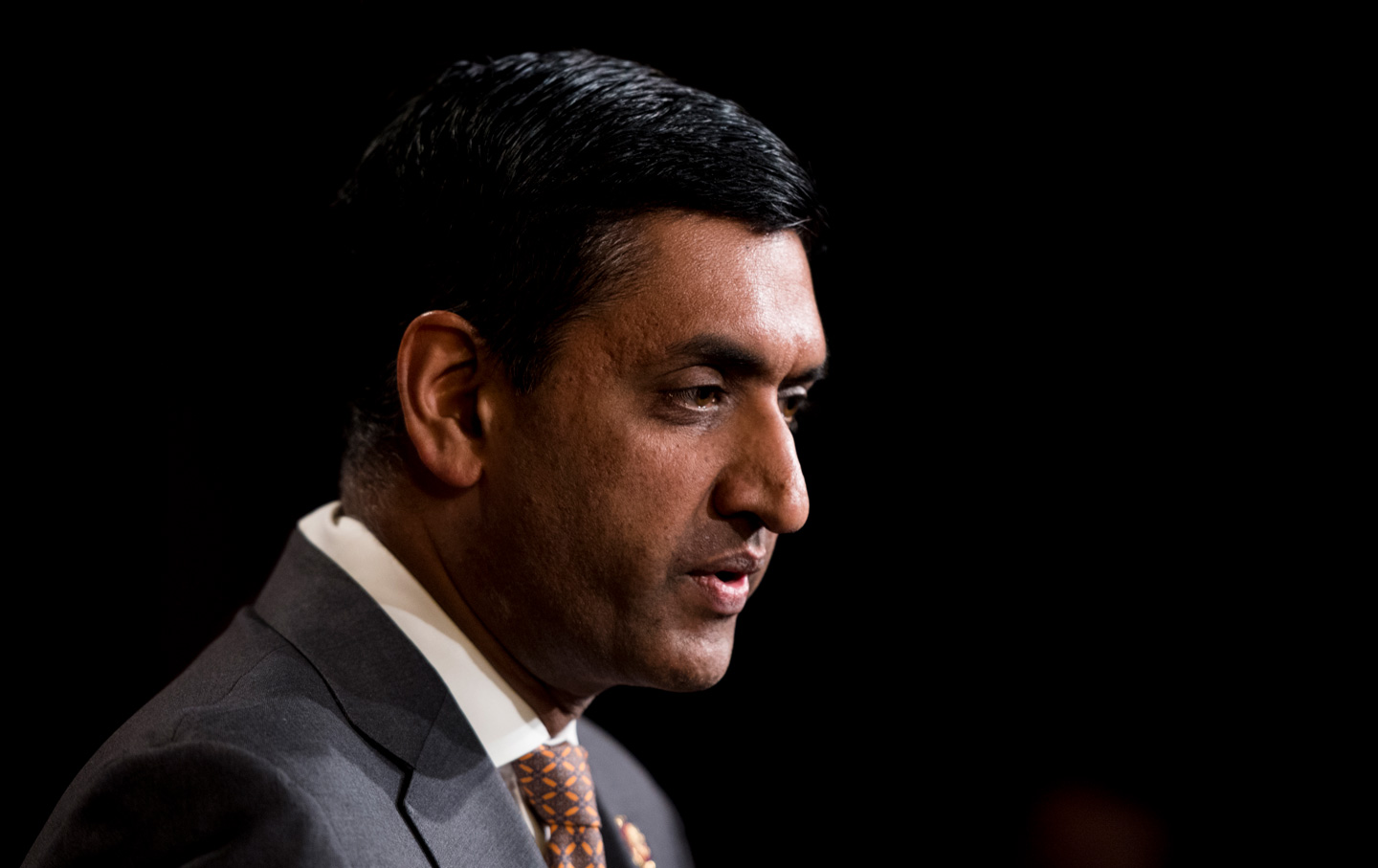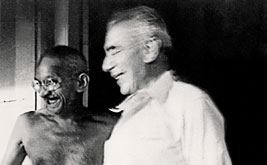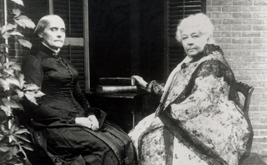
A Manifesto for Dignity in a Digital Age A Manifesto for Dignity in a Digital Age
On Ro Khanna’s bold vision.
Feb 7, 2022 / Martha C. Nussbaum

Haterz Gonna Hate? Haterz Gonna Hate?
There are limits to what the law can do to police cyberabuse.
Nov 5, 2014 / Books & the Arts / Martha C. Nussbaum
Exchange Exchange
Of Thee I Singh San Francisco I would like to point out some elementary factual errors in Martha Nussbaum’s review of Joseph Lelyveld’s biography of Mahatma Gandhi, “Gandhi and South Africa” [Oct. 31]. In it she compares India’s prime minister, Manmohan Singh, to Gandhi. Nussbaum thinks Singh’s “dignified behavior” must “make Americans wonder how he ever could have won an election.” However, Singh is a member of the Rajya Sabha (the upper house of Parliament, similar to the British House of Lords), where people are nominated, not elected. In fact, the only time he contested for the Lok Sabha (the lower house of Parliament), he was unable to win the seat. Nussbaum also claims that Singh, along with Sonia Gandhi, “has refocused political energy on the plight of the poorest, devising the Rural Employment Guarantee and the new Right to Food program.” This is the same Singh who is the architect of India’s neoliberal reforms, which have, since the 1990s, devastated India’s countryside, resulting in massive agrarian distress. Public hospitals have never been in sorrier shape, while swanky private hospitals catering to foreigners and rich Indians are mushrooming. Nussbaum’s claim that Singh and Sonia Gandhi devised the National Rural Employment Guarantee Act (NREGA) is also misleading. As Arundhati Roy points out in her excellent book Field Notes on Democracy: “Ironically the NREGA only made it through parliament because of pressure brought to bear on the UPA [United Progressive Alliance] government by the Left Front, and it must be said, by Sonia Gandhi. It was passed despite tremendous resistance from the mandarins of the free market within the Congress Party.” Although NREGA is considered a revolutionary act, it is simply crumbs the state throws to the masses, who are up in arms all over India, for all the devastation the act has caused. SANJEEV MAHAJAN Nussbaum Replies Chicago I am grateful for Sanjeev Mahajan’s views about the Congress Party, which of course are shared by many of its opponents. At the time of the 2008 election, Manmohan Singh had been named as the person who would be prime minister should Congress win a majority, and he campaigned with that understanding (and he was sitting prime minister). So voters knew that a vote for Congress was a vote for him to continue in that office. They voted; the party won; he continued as prime minister. That, to me, is an obvious sense of winning an election. As for the NREGA: Mahajan does not dispute that it is a laudable achievement; he only claims that it was supported by the left parties as well as Congress. However, the record shows that India’s poor are ill advised, at least today, to rely on the left parties. In West Bengal, the CPI-M (the leading left party) went to defeat this year after years of failure to deliver a reasonable level of health, education or employment; and that party’s compromises with corporate investors, resisted by local peasants, provoked ugly assaults by the CPI-M’s cadres, who shot unarmed peasants in the back (see my “Violence on the Left: Nandigram and the Communists of West Bengal,” Dissent, Spring 2008). I do not say this to praise the new (post-CPI-M) Bengal government, which surely has little to commend it. My point is that the left has not fulfilled its promises to the poor, while Congress, on the national level, has actually crafted and passed a major program, both admirable and practical. This program, as I said, was crafted by Jean Drèze, in collaboration with Sonia Gandhi. I admire Arundhati Roy’s skill as a writer and her moral intensity; but her nonfiction writings are highly polemical and should not be one’s only source of information for such matters. MARTHA NUSSBAUM We apologize for clipping the T off letter-writer James M. Voigt’s name [“Letters,” Nov. 28].
Nov 21, 2011 / Our Readers and Martha C. Nussbaum

Gandhi and South Africa Gandhi and South Africa
Why was Joseph Lelyveld’s history of Gandhi’s years in South Africa attacked by India’s Hindu right?
Oct 12, 2011 / Books & the Arts / Martha C. Nussbaum
Letters Letters
GDP RAISES ALL BOATS Cambridge, Mass. The answer to Martha Nussbaum’s “What Makes Life Good?” [May 2] might have been different if she had presented some key facts, namely, that virtually every statistical test shows a strong relationship (“trickle down”) between growth in national income (GDP), which she disparages as a measure of well-being, and reduction in poverty. Why? Because increases in GDP raise paid employment—having a good paid job means not being poor for landless people like Vasanti, Nussbaum’s protagonist; it’s the default of poverty in today’s developing world. Even in African countries with large mining and agricultural estates and unequal income distribution, poverty has sharply fallen since 2005 because prices of minerals and cash crops have risen, and the incomes of miners and poor agricultural workers have improved. How to create good jobs (every survivor in a poor country works, but typically in self-employment at a subsistence level)? Nussbaum praises the Capabilities approach: making job seekers better clothed, housed, fed and educated (“a crucial avenue of opportunity”). But in developing countries, where educated unemployment is rife, investing in job seekers’ right to education doesn’t create remunerative work; usually better qualified job seekers simply join the unemployed, or the brain drain if they’re lucky. More jobs require pressure on government (local, state and national) to invest in job creation. Graffiti in one Indian village read, “We will give the Congress Party our vote if it gives us a job.” And it did, by promising 2 million government jobs to trigger more private sector employment. So “what makes life good” for Vasanti is not just reforming the household and bettering the village; it’s becoming a progressive national activist to influence decisions at the top of the power pyramid, not just decisions about education and security but also about capital investments and employment. ALICE AMSDEN Massachusetts Institute of Technology Nussbaum Replies Chicago I am very grateful to Professor Amsden for her thoughtful and provocative letter. Her defense of GDP omits, however, a crucial question: how should we define poverty? I argue that the right question to ask is, What are people actually able to do and be?—in a wide range of areas, including health, bodily integrity, education, political rights and liberties, employment opportunities and quite a few others. If we think of poverty as the absence of the Central Human Capabilities on my list, then it is simply not true that increased GDP by itself “trickles down” to relieve poverty. Field studies of the different Indian states, conducted by Jean Dreze and Amartya Sen, show that growth is poorly correlated with achievements in health and education: Kerala, whose economy has not grown well, has stunning educational achievements (99 percent male and female literacy in adolescent years, dramatically different from the national averages I reported) and equally impressive health achievements; states like Gujarat and Andhra Pradesh, which have focused on growth, lag behind in health and education (see Dreze and Sen, India Development: Selected Regional Perspectives, Oxford, 1997). Nor does the independence of health and education from GDP disappear when we turn to the more affluent countries: Kerala’s general health achievements are similar to those of Harlem in New York City, which is good for a poor state in a poor country but shameful in a rich nation like ours (see Sen, “The Economics of Life and Death,” Scientific American, May 1993). Now let us consider women’s vulnerability to violence, a key part of Vasanti’s story. Unfortunately, although good data are hard to come by, we can confidently conclude that our rich nation has a shamefully high rate of violence against women. The Violence Against Women survey published by the Bureau of Justice Statistics estimates that 18 percent of US women have experienced rape or attempted rape, usually from an intimate partner; the rate of other physical violence is approximately double that. Finally, let us consider political and religious liberty: does increased GDP per capita “trickle down” to produce these good things? People used to say so, predicting that China would soon change. Time has told a different story. In short: if we think of poverty and well-being broadly, as I argue we should, increased GDP alone proves incomplete, and GDP information will not tell us how people are faring in these other, also important, respects. I agree with Professor Amsden that job creation is extremely important: education is only part of what government should provide. So I endorse the Rural Employment Guarantee instituted by India’s Congress Party (for which much credit is due to Jean Dreze). Even if government were to give people not only education but also a basic minimum livelihood, this would be inferior to job creation from the point of view of agency and self-respect: jobs allow people to control their own destiny rather than making them passive dependents. MARTHA NUSSBAUM The Goldstone ‘Recant’ Mill Valley, Calif. My thanks to Adam Horowitz, Lizzy Ratner and Philip Weiss for exposing the distortions of what Judge Richard Goldstone actually wrote in his April 1 op-ed for the Washington Post [“The Goldstone Affair,” May 2]. The authors argued convincingly that Judge Goldstone did not “recant” the report, as supporters of Israel’s far-right government claim. But I wish they had questioned his use of the word “deliberate” when it came to Israel’s actions against Gaza civilians. What else accounted for Israel’s indiscriminate use of artillery, white phosphorus weapons and bombs in one of the world’s most densely populated areas, if not the deliberate targeting of civilians? Why did the Israelis level public buildings, a large food warehouse, small factories and sewage and water facilities, if not to punish civilians? And why, oh why, did they destroy a large chicken farm and kill 31,000 chickens? The word “deliberate” is often in the eye of the beholder. But I can see nothing accidental about Operation Cast Lead, especially since the casualty figures—1,400 Gazans and thirteen Israelis dead—indicate that Israeli soldiers were not acting in self-defense. RACHELLE MARSHALL North Haven, Conn. “The Goldstone Affair” may have created an unnecessary opacity in its account of Goldstone’s two after-statements on his report. It has him saying to the AP, after apparently renouncing the report, that “as presently advised I have no reason to believe any part of the report needs to be reconsidered at this time.” A bizarre case of asserting A and then Not A. However, his full statement, according to the AP story, was this: “As appears from the Washington Post article, information subsequent to publication of the report did meet with the view that one correction should be made with regard to intentionality on the part of Israel,” the judge said. “Further information as a result of domestic investigations could lead to further reconsideration, but as presently advised I have no reason to believe any part of the report needs to be reconsidered at this time.” He meant to make one correction (not minor but not definitive of the report’s total findings): on the charge of intentionality of government policy. Though “further information” might lead to “further reconsideration,” he has, at present, “no reason to believe that any [further] part of the report needs to be reconsidered at this time.” The authors’ shortened quotation makes him sound simply self-contradictory. Whatever his motives—judging by the op-ed and the AP correction alone—he was unexpectedly careless in the op-ed and reasonably careful in the interview. DAVID BROMWICH Palm Coast, Fla. Israel’s foreign minister accused Richard Goldstone of giving “legitimacy to terrorist organizations.” Israel already did that by electing two former terrorist leaders to be prime ministers. Menachem Begin of the Irgun proudly called himself Terrorist No. 1. My experience of the Middle East in the mid-’40s leads me to believe that Stern Gang leader Yitzhak Shamir deserves that title. HORACE HONE The Spider Woman Rita Hayworth Tango Pittsburgh Natasha Wimmer points out, in “The Cursi Affair” [May 9], Manuel Puig’s formidable contribution to the Latin American literature of cursi. But as Pamela Bacarisse has shown in her two studies of Puig’s novels (The Necessary Dream and Impossible Choices), Puig treated popular culture and high culture with equal seriousness. They both deal with the human need to make “the universe less hideous and time less heavy” (Baudelaire). Puig’s vision of life was essentially bleak, but it helped him understand the lives of quiet desperation of others. KEITH McDUFFIE Swans & Zombies & Book Clubs, Oh My! Montreal Our book club met in April to discuss The Black Swan. Some loved Nassim Taleb. Others hated him. But all would agree that Joshua Clover’s “Swans and Zombies” [April 25] gets Taleb all wrong. Indeed, anyone who skim-reads The Black Swan in Barnes & Noble could tell you that. Like the Fight Club, our book club has a few simple rules: first and foremost, if you wish to join us for a symposium, you must read the entire book. Unlike Clover, we think it unethical (and shameful) to talk about books you haven’t read. When reviewers play with ideas they haven’t earned, they signal disrespect for ideas and authors, as well as contempt for readers. JOHN FAITHFUL HAMER Clover Replies Ithaca, N.Y. I have been impressed with the fierce defenses marshaled by the faithful on behalf of Taleb’s book, which I have read with all the diligence it requires. It would be unfortunate if such spirited engagements, focusing their energies on what is a mere fillip in an extended review, ignored the books and issues that are its contents—i.e., catastrophic crisis as a characteristic of capitalism rather than as a consequence of one of its recent management styles, and thus not easily resolved by such conventional choices—when such attention is all one can ask from a serious reader. JOSHUA CLOVER
May 25, 2011 / Our Readers, Martha C. Nussbaum, and Joshua Clover

What Makes Life Good? What Makes Life Good?
Measurements of economic growth fail to capture many facets of well-being.
Apr 13, 2011 / Feature / Martha C. Nussbaum

Representative Women Representative Women
Christine Stansell's The Feminist Promise is a landmark book, yet is indifferent to the role of ideas in feminism's history.
Oct 6, 2010 / Books & the Arts / Martha C. Nussbaum
Legal Weapon Legal Weapon
International law offers protection to the oppressed. In Are Women Human?, feminist legal scholar Catharine A. MacKinnon exposes the hypocrisy of not extending the same protectio...
Jul 13, 2006 / Books & the Arts / Martha C. Nussbaum
In a Lonely Place In a Lonely Place
Elizabeth Cady Stanton's legacy as both an admirable revolutionary and a profound thinker is brought to life in Vivian Gornick's The Solitude of Self.
Feb 9, 2006 / Books & the Arts / Martha C. Nussbaum
Epistemology of the Closet Epistemology of the Closet
A biography of Utilitarian philosopher Henry Sidgwick sheds new light on life in the Victorian era.
May 19, 2005 / Books & the Arts / Martha C. Nussbaum
